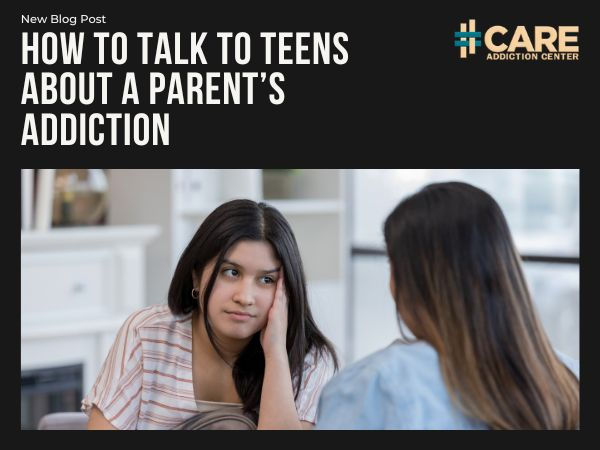How to Talk to Teens About a Parent’s Addiction
- weblead3
- Jul 28
- 3 min read

As the back-to-school season approaches, families are transitioning into new routines, fresh schedules, and a renewed focus on emotional and mental well-being. It’s a natural moment to reflect on communication within the home — especially if your family has been affected by addiction.
If a parent is currently in treatment, early recovery, or still struggling with addiction, teens in the household are likely aware that something is going on. While many parents want to protect their children by avoiding difficult conversations, the truth is that honest, age-appropriate dialogue builds trust, provides clarity, and offers teens the emotional tools they need to navigate uncertainty.
Here’s how to start that important conversation with your teen.
1. Why This Conversation Is So Important
Teenagers are more observant than we often give them credit for. Even if no one has explained what’s happening, they may already sense the tension, notice changes in behavior, or feel like something isn’t quite right at home. Without honest context, teens may:
Blame themselves for a parent’s behavior
Withdraw emotionally
Act out due to confusion or stress
Internalize feelings of fear, shame, or guilt
Talking about addiction can actually reduce these reactions. It lets teens know they are not alone, not to blame, and not responsible for fixing the situation.
2. Choose the Right Moment
You don’t need a formal sit-down to open the door to conversation — in fact, teens often respond better to more casual, less pressured moments. Consider:
A car ride
A walk together
Downtime at home with no distractions
Avoid starting the conversation during or immediately after conflict, or when emotions are high. The goal is to create an environment of calm and openness where your teen feels safe to ask questions and express themselves.
3. Speak Honestly — and Age-Appropriately
It’s okay not to have all the answers. What matters is being honest, using language your teen can understand, and making it clear that they are not the cause of a parent’s addiction.
Examples of how you might begin:
“I want to talk with you about what’s been going on with Dad. He has an illness called addiction, and it affects how he behaves sometimes.”
“Mom is getting help because she’s struggling with something called substance use disorder. It’s not your fault, and it’s okay to talk about how you’re feeling.”
Keep the explanation simple and avoid overloading them with details. You can always revisit the conversation later — and you should.
4. Acknowledge and Validate Their Feelings
Your teen might respond with anger, sadness, fear, confusion — or even silence. All of that is normal. Let them know:
Their emotions are valid
It’s okay to talk about hard things
You are here for them, no matter what
One of the most powerful things you can do is simply listen without judgment. Your teen may not want to open up right away, but your patience and consistency will build a bridge over time.
5. Offer Supportive Resources
Teens don’t just need explanations — they need support. Depending on their personality and age, different options may help:
A trusted adult outside the home (counselor, coach, mentor)
Family therapy
School social worker
Peer support groups like Alateen: https://al-anon.org/for-members/group-resources/alateen/
You might say: “You don’t have to go through this alone. There are people you can talk to besides me, if that feels easier.”
6. Reinforce This Truth: It’s Not Their Fault
Addiction is a complex brain disease. Teens may worry they caused the problem by misbehaving, being too needy, or making things stressful at home. This belief can linger for years unless you address it head-on.
Reiterate clearly and often:
“This isn’t your fault.”
“You didn’t cause this, and you can’t fix it.”
“We’re doing everything we can to get through this as a family.”
This message brings emotional relief and reduces the chances of your teen internalizing guilt or resentment.
Conclusion
Talking to your teen about a parent’s addiction may feel overwhelming at first, but these conversations are a vital part of family healing. When done with honesty, compassion, and consistency, they lay the groundwork for resilience, emotional safety, and connection.
As the school year begins, it’s a good time to embrace openness and prioritize emotional well-being — not just academics. Your teen doesn’t need a perfect script. They just need to know you’re present, honest, and committed to helping them navigate this journey together.
